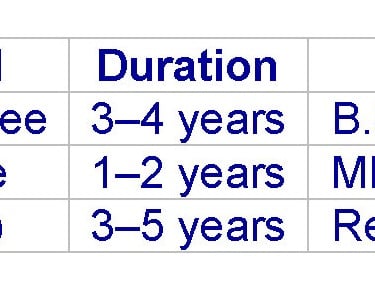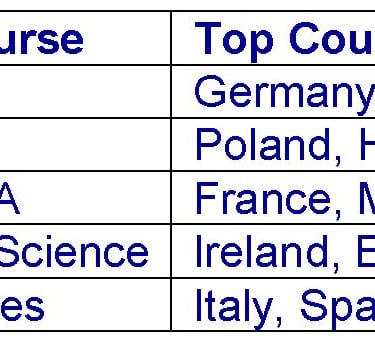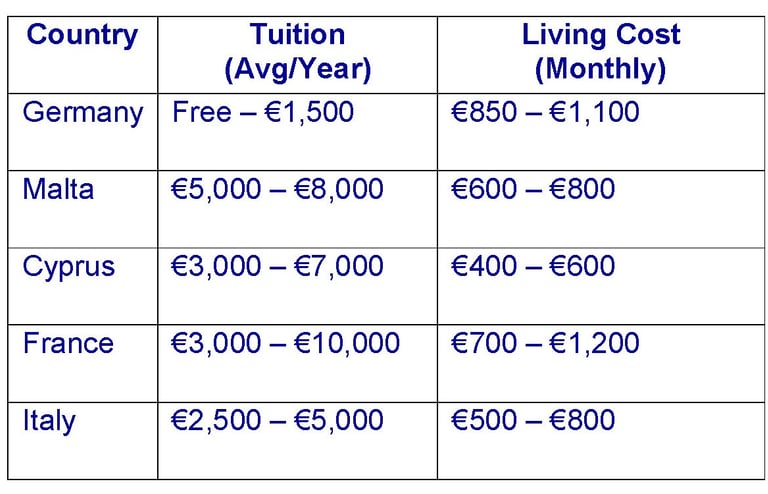✉ shreeconsultancyjsb@gmail.com ✆ Ph. No.: +91 78781-47589 , +91 97828-06464

Study in Europe – Top Destinations & Guide for Indian Students in 2025
Study in Europe for Indian students is a dream come true in 2025. Discover affordable countries like Malta and Cyprus, top universities, scholarships, and visa tips to start your journey abroad.
Study in Europe – Top Destinations & Guide for Indian Students in 2025
Europe continues to be a hotspot for Indian students seeking quality education, cultural exposure, and international career opportunities. In 2025, the trend is booming more than ever, thanks to affordable tuition options, globally ranked universities, and simplified visa processes.
Whether you dream of studying art in Italy, technology in Germany, or business in Malta or Cyprus, this comprehensive guide covers everything you need to know.
Why Choose Europe for Higher Education?
Europe is a diverse academic ecosystem, home to 30+ countries offering high-quality education with globally recognized degrees. Here’s why Indian students should consider Europe:
Top-tier Education: Over 300 universities ranked in QS World Rankings.
Cost-Effective: Countries like Germany, Cyprus, and Malta offer budget-friendly programs.
Multicultural Environment: Exposure to various languages, lifestyles, and global student communities.
English-Taught Programs: Thousands of degrees available in English.
Post-Study Work Visas: Opportunities to gain international work experience.
Overview of the European Education System
Europe’s Bologna Process ensures educational standards are uniform across countries. Most degrees follow this structure:
The ECTS (European Credit Transfer System) makes it easy to transfer credits between universities.
Best Countries in Europe for Indian Students
Europe is rich in educational opportunities, but some countries stand out for their affordability, quality, and visa support.
Study in Germany – Tuition-Free Public Universities
Germany offers zero tuition fees at most public universities. It’s known for engineering, computer science, and STEM courses. The DAAD Scholarship helps cover living costs.
Study in France – Culture, Cuisine, and Courses
France blends academic excellence with art and culture. Many programs are taught in English, and Campus France streamlines the application process for Indian students.
Study in Italy – Art, Architecture, and Academics
Italy’s universities like Sapienza University of Rome and Politecnico di Milano attract students in design, architecture, and humanities. Italy offers scholarships and a charming lifestyle.
Study in Spain – Affordable Lifestyle & Education
Spain offers affordable education and a vibrant student life. Programs in medicine, business, and hospitality are popular.
Study in Netherlands – Tech & Research Hub
The Netherlands is ideal for tech and innovation fields. It offers numerous English-taught programs and part-time job options for students.
Study in Malta – The Mediterranean Education Gem
Malta is gaining popularity for its affordable education and English-speaking environment.
Cost of Living in Malta
Indian students can live comfortably on €600–€800 per month, covering rent, food, and transport.
Top Universities in Malta
University of Malta
Malta College of Arts, Science & Technology (MCAST)
Malta also offers part-time work options and a friendly visa policy for Indians.
Study in Cyprus – A Rising Star in European Education
Cyprus is one of the most affordable countries in Europe for Indian students.
Popular Universities in Cyprus
University of Cyprus
European University Cyprus (EUC)
Near East University
Tuition & Scholarships
Bachelor’s degrees cost €3,000–€7,000 per year. Scholarships are available for academic merit and early applications.
Top Courses to Study in Europe for Indian Students
Cost of Studying in Europe – Tuition & Living
Scholarships for Indian Students in Europe
Erasmus+: Pan-European scholarship with tuition, travel, and living costs.
DAAD: German scholarship for postgrads.
Eiffel Excellence Scholarship: For French universities.
Government & University Grants: Available in Cyprus, Malta, Netherlands.
Student Visa Process for Europe
Visa requirements vary by country. Here’s a basic checklist:
Offer Letter from a European university
Proof of funds (bank statement)
Health insurance
Valid passport
Visa application form & fee
Schengen Visa allows short-term travel across 27 countries, while study visas vary in duration and renewal rules.
Work Opportunities While Studying in Europe
Most European countries allow students to work 20 hours/week during semesters and full-time during breaks.
Germany: €12–€15/hour
Malta: Up to 20 hours/week
Cyprus: Limited hours, usually in designated sectors
After graduation, students can apply for post-study work permits (Germany: 18 months, France: 2 years).
Life as an Indian Student in Europe
Life in Europe offers:
Rich cultural experiences
Diverse cuisines
Affordable student housing
Efficient public transport
Student communities, Indian associations, and multicultural events ease the transition.
How to Apply to European Universities
Shortlist Universities
Prepare Documents (SOP, LORs, CV)
Apply through University Portals
Track Results & Visa
Tip: Apply 8–10 months in advance for better chances at scholarships and housing.
Tips for Adjusting to Life in Europe
Learn local basics of language and etiquette.
Keep emergency contacts and embassy details.
Budget wisely and explore student discounts.
Mistakes to Avoid When Studying in Europe
Missing visa appointments or deadlines
Not checking course accreditation
Poor financial planning
Ignoring health insurance requirements
FAQs About Studying in Europe in 2025
Q1. Can I study in Europe without IELTS?
Yes, countries like Malta, Cyprus, and Germany offer alternatives like Duolingo, MOI, or English-medium transcripts.
Q2. Is Malta good for Indian students?
Absolutely. Affordable tuition, English-speaking environment, and globally accepted degrees make it ideal.
Q3. What are the cheapest countries to study in Europe?
Germany, Cyprus, and Malta top the list for affordability and quality.
Q4. Do European degrees have global value?
Yes. Degrees from EU countries are recognized worldwide, often accredited by international bodies.
Q5. Can I stay in Europe after studying?
Most countries offer post-study work visas, especially in fields like tech and business.
Q6. How much bank balance is needed for a European student visa?
Varies, but on average €6,000–€10,000 for one year.
Final Thoughts – Is Europe Right for You?
If you're looking for affordable tuition, globally respected education, and a culturally rich life experience, studying in Europe is a fantastic option in 2025. With countries like Malta and Cyprus rising fast, now’s the perfect time to start your journey.






